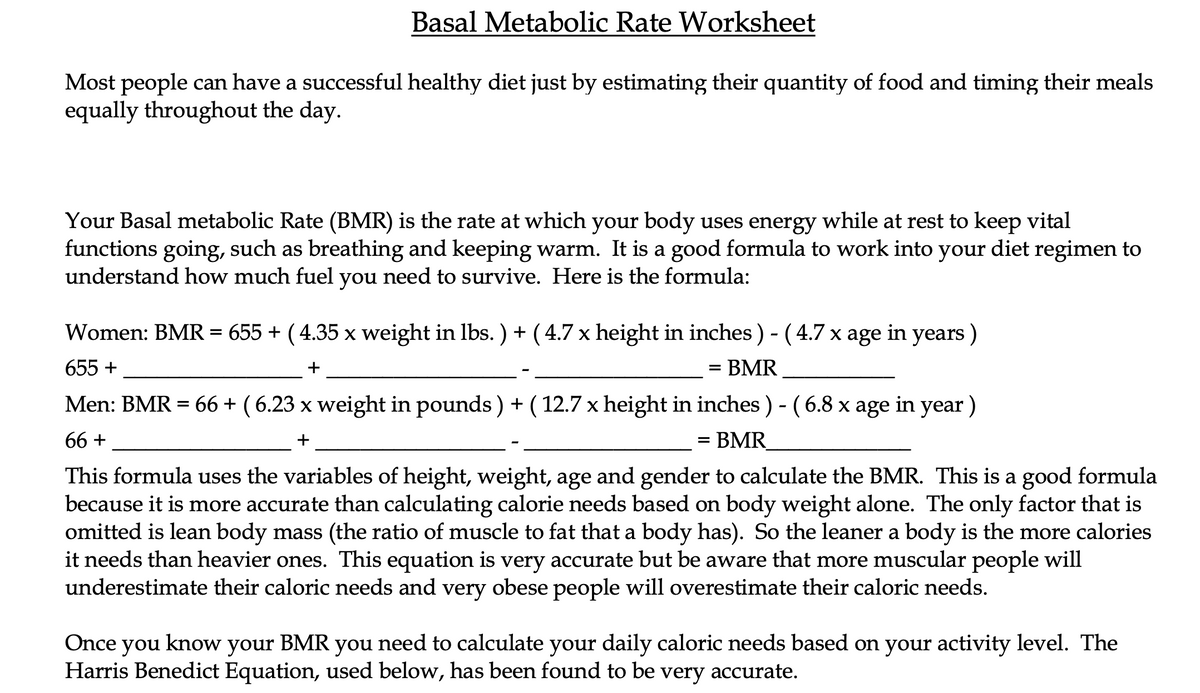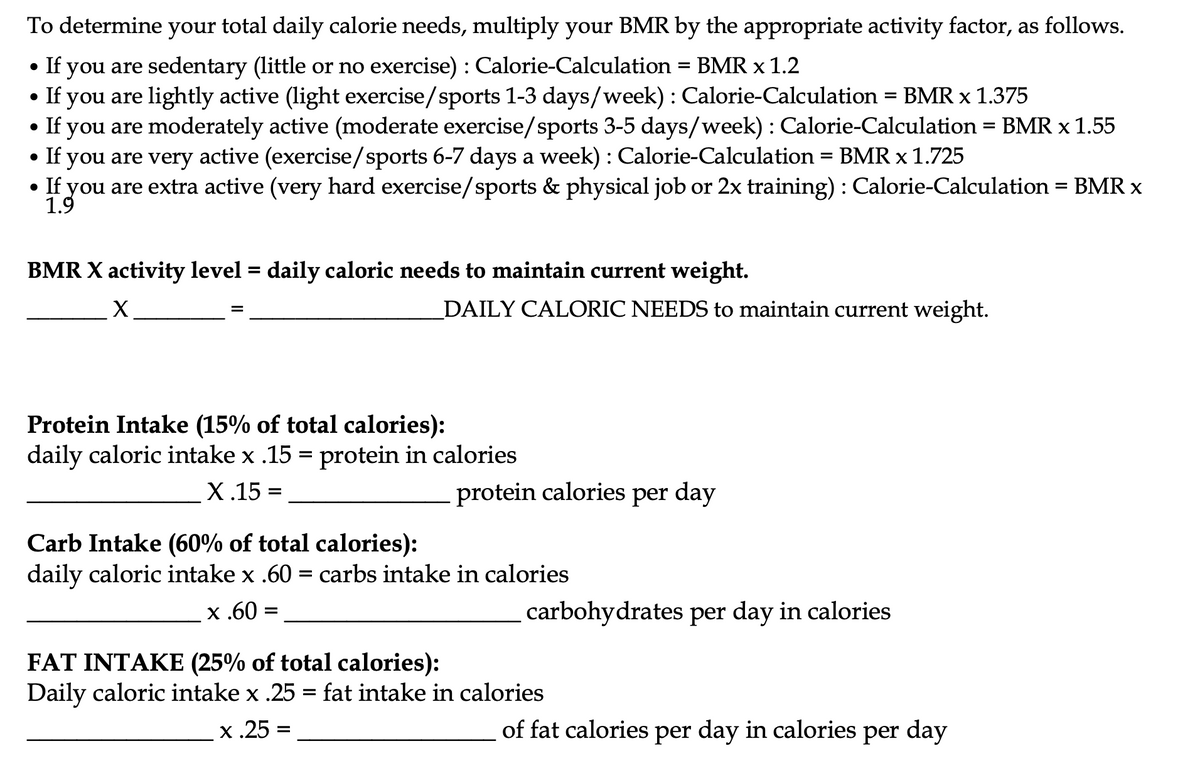Women: BMR = 655 + ( 4.35 x weight in Ibs. ) + (4.7 x height in inches ) - (4.7 x age in years ) 655 + + = BMR Men: BMR = 66 + ( 6.23 x weight in pounds ) + ( 12.7 x height in inches ) - (6.8 x age in year ) 66 + = BMR
Women: BMR = 655 + ( 4.35 x weight in Ibs. ) + (4.7 x height in inches ) - (4.7 x age in years ) 655 + + = BMR Men: BMR = 66 + ( 6.23 x weight in pounds ) + ( 12.7 x height in inches ) - (6.8 x age in year ) 66 + = BMR
Human Physiology: From Cells to Systems (MindTap Course List)
9th Edition
ISBN:9781285866932
Author:Lauralee Sherwood
Publisher:Lauralee Sherwood
Chapter17: Energy Balance And Temperature Regulation
Section: Chapter Questions
Problem 1SQE
Related questions
Question

Transcribed Image Text:Basal Metabolic Rate Worksheet
Most people can have a successful healthy diet just by estimating their quantity of food and timing their meals
equally throughout the day.
Your Basal metabolic Rate (BMR) is the rate at which your body uses energy while at rest to keep vital
functions going, such as breathing and keeping warm. It is a good formula to work into your diet regimen to
understand how much fuel you need to survive. Here is the formula:
Women: BMR = 655 + ( 4.35 x weight in lbs. ) +( 4.7 x height in inches ) - ( 4.7 x age in years )
655 +
- BMR
Men: BMR = 66 + ( 6.23 x weight in pounds ) + ( 12.7 x height in inches ) - (6.8 x age in year)
66 +
= BMR_
This formula uses the variables of height, weight, age and gender to calculate the BMR. This is a good formula
because it is more accurate than calculating calorie needs based on body weight alone. The only factor that is
omitted is lean body mass (the ratio of muscle to fat that a body has). So the leaner a body is the more calories
it needs than heavier ones. This equation is very accurate but be aware that more muscular people will
underestimate their caloric needs and very obese people will overestimate their caloric needs.
Once you know your BMR you need to calculate your daily caloric needs based on your activity level. The
Harris Benedict Equation, used below, has been found to be very accurate.

Transcribed Image Text:To determine your total daily calorie needs, multiply your BMR by the appropriate activity factor, as follows.
• If you are sedentary (little or no exercise) : Calorie-Calculation = BMR x 1.2
• If you are lightly active (light exercise/sports 1-3 days/week) : Calorie-Calculation = BMR x 1.375
If you are moderately active (moderate exercise/sports 3-5 days/week) : Calorie-Calculation = BMR x 1.55
• If you are very active (exercise/sports 6-7 days a week) : Calorie-Calculation = BMR x 1.725
%D
you are extra active (very hard exercise/sports & physical job or 2x training) : Calorie-Calculation = BMR x
1.9
• If
BMR X activity level = daily caloric needs to maintain current weight.
X
DAILY CALORIC NEEDS to maintain current weight.
Protein Intake (15% of total calories):
daily caloric intake x .15 = protein in calories
Х.15 -
protein calories per day
Carb Intake (60% of total calories):
daily caloric intake x .60 = carbs intake in calories
x .60 =
carbohydrates per day in calories
FAT INTAKE (25% of total calories):
Daily caloric intake x .25 = fat intake in calories
x.25 =
of fat calories per day in calories per day
Expert Solution
This question has been solved!
Explore an expertly crafted, step-by-step solution for a thorough understanding of key concepts.
This is a popular solution!
Trending now
This is a popular solution!
Step by step
Solved in 2 steps

Knowledge Booster
Learn more about
Need a deep-dive on the concept behind this application? Look no further. Learn more about this topic, biology and related others by exploring similar questions and additional content below.Recommended textbooks for you

Human Physiology: From Cells to Systems (MindTap …
Biology
ISBN:
9781285866932
Author:
Lauralee Sherwood
Publisher:
Cengage Learning

Biochemistry
Biochemistry
ISBN:
9781305577206
Author:
Reginald H. Garrett, Charles M. Grisham
Publisher:
Cengage Learning


Human Physiology: From Cells to Systems (MindTap …
Biology
ISBN:
9781285866932
Author:
Lauralee Sherwood
Publisher:
Cengage Learning

Biochemistry
Biochemistry
ISBN:
9781305577206
Author:
Reginald H. Garrett, Charles M. Grisham
Publisher:
Cengage Learning
